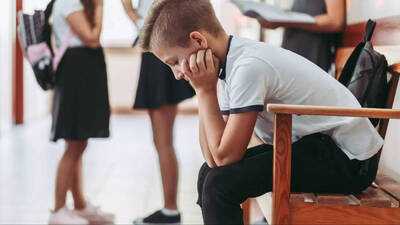
Does your child complain, “
Nobody wants to play with me” or “
I feel left out”? Social belonging is not just about having friends, it is a fundamental human need and for children, being included in peer groups strongly influences their self-esteem, motivation and even academic success. Parents cannot help but worry when their child feels excluded at school.
Feeling left out is painful but it does not have to define your child’s school experience. By listening empathetically to them, teaching them social skills, encouraging activities, partnering with their teachers and reinforcing resilience at home, parents can equip their children to navigate social challenges. Let’s explore strategies that can help children build resilience and healthier peer connections -
Acknowledge their feelings
The first step is to listen without judgment. Minimising their emotions by saying, “
Don’t worry, you’ll make friends”, may make them feel unseen. According to a 2013 study published in the
Journal of Child Psychology and Psychiatry found that children who feel validated by parents when discussing peer difficulties, show lower levels of social anxiety and higher confidence in managing relationships.
Teach social skills proactively
Sometimes children need guidance on how to join group activities, start conversations or read social cues.
A 2016 study in the
Journal of Applied Developmental Psychology highlighted that children with explicit social skills training (like role-play and guided practice) were more likely to be accepted by peers within a school year.
Encourage extracurricular involvement
Joining clubs, sports or creative groups gives children opportunities to connect with like-minded peers outside of rigid classroom circles. As per a 2017 study in the
American Journal of Community Psychology, participation in structured extracurriculars not only boosts peer belonging but also protects against loneliness and school disengagement.
Work with teachers as allies
Teachers see the classroom dynamics daily and can help by pairing your child with supportive peers or facilitating group inclusion. A 2015 study in
Teaching and Teacher Education found that when teachers intentionally foster inclusive group work, socially isolated children show increased classroom participation and peer acceptance.
Build resilience at home
While parents cannot control every school interaction, they can strengthen their child’s self-worth by highlighting unique strengths, encouraging hobbies and providing unconditional support. In a 2018 study in the
Journal of Youth and Adolescence, researchers noted that children with strong family support systems showed lower psychological distress even when facing peer exclusion.
Remember, peer groups may change but the confidence and coping skills children develop with parental guidance will last a lifetime.
-
Suryakumar Yadav Was Wrong in Withdrawing Appeal vs UAE Batter? Ajinkya Rahane Lambastes India Captain's Critics

-
If you make your friends buy things using your credit card, you will receive an IT notice, this is the way to avoid it..

-
RBI: If you do not repay the loan of the phone taken on EMI, it will be locked, RBI is bringing a new rule..

-
Digital Frauds: Digital frauds are the biggest problem of the country, this is how you can avoid fraudsters..

-
Career Growth: Networking is not just about making contacts, right people and strategies can help you achieve career success..
